Time Faulkner Quotes & Sayings
Enjoy reading and share 100 famous quotes about Time Faulkner with everyone.
Top Time Faulkner Quotes
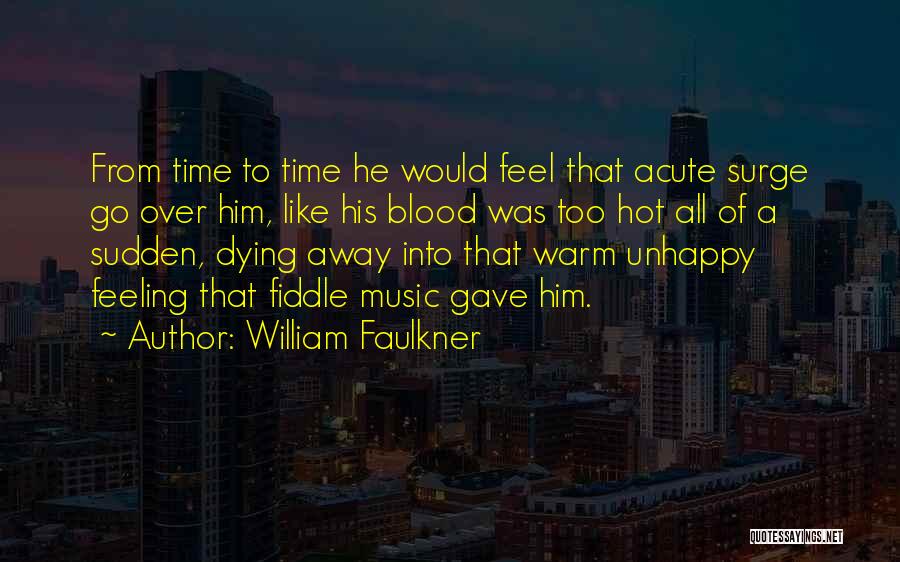
From time to time he would feel that acute surge go over him, like his blood was too hot all of a sudden, dying away into that warm unhappy feeling that fiddle music gave him. — William Faulkner

I prefer to think that no writer has got time to be too concerned with style, that he is simply telling this dramatic instance in the most effective way he knows, that the book, the story, creates its own style. — William Faulkner

I made an executive decision in college when I learned how behind I was in the world of books, films, and music because of my rural upbringing. I really reduced the amount of time that sports took up in my life.I still have some Faulkner to get through. — Nick Offerman
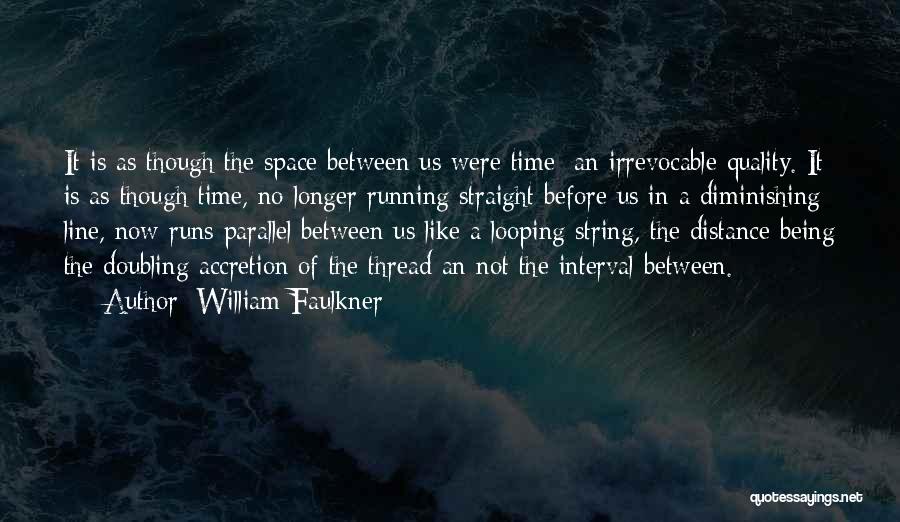
It is as though the space between us were time: an irrevocable quality. It is as though time, no longer running straight before us in a diminishing line, now runs parallel between us like a looping string, the distance being the doubling accretion of the thread an not the interval between. — William Faulkner

Time is a fluid condition which has no existence except in the momentary avatars of individual people. There is no such thing as was - only is. — William Faulkner
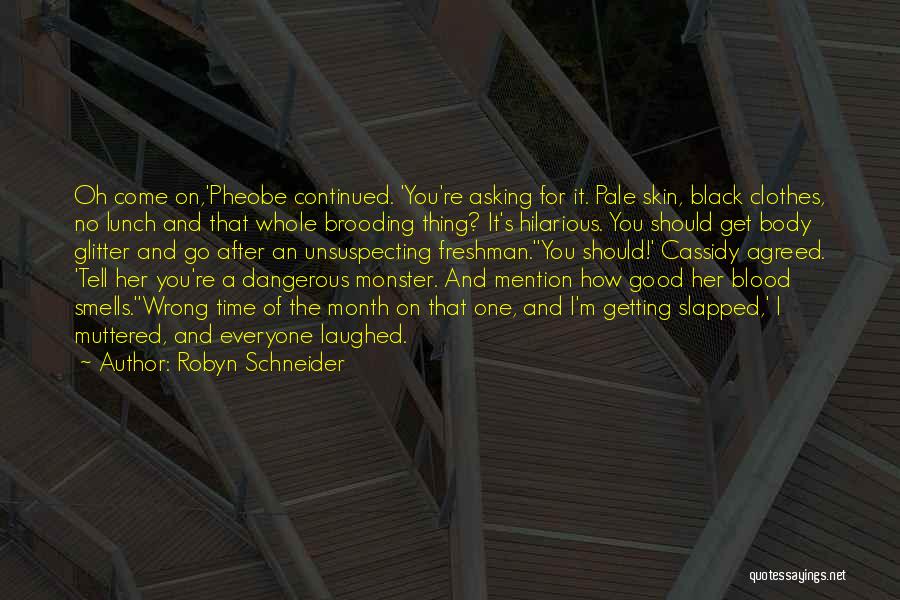
Oh come on,'Pheobe continued. 'You're asking for it. Pale skin, black clothes, no lunch and that whole brooding thing? It's hilarious. You should get body glitter and go after an unsuspecting freshman.'
'You should!' Cassidy agreed. 'Tell her you're a dangerous monster. And mention how good her blood smells.'
'Wrong time of the month on that one, and I'm getting slapped,' I muttered, and everyone laughed. — Robyn Schneider

Clocks slay time ... time is dead as long as it is being clicked off by little wheels; only when the clock stops does time come to life. — William Faulkner

it was as if he had swung outward at the end of a grape vine, over a ravine, and at the top of the swing had been caught in a prolonged instant of mesmerized gravity, weightless in time. — William Faulkner

And i temporary and he was the saddest word of all there is nothing else in the world its not despair until time its not even time until it was — William Faulkner

Stories are there to be told, and each story changes with the telling. Time changes them. Logic changes them. Grammar changes them. History changes them. Each story is shifted side-ways by each day that unfolds. Nothing ends. The only thing that matters, as Faulkner once put it, is the human heart in conflict with itself. At the heart of all this is the possibility, or desire, to create a piece of art that talks to the human instinct for recovery and joy. — Colum McCann

I give it to you not that you may remember time, but that you might forget it now and then for a moment and not spend all your breath trying to conquer it. — William Faulkner

Ever since the days when such formidable mediocrities as Galsworthy, Dreiser, Tagore, Maxim Gorky, Romain Rolland and Thomas Mann were being accepted as geniuses, I have been perplexed and amused by fabricated notions about so-called "great books." That, for instance, Mann's asinine "Death in Venice," or Pasternak's melodramatic, vilely written "Dr. Zhivago," or Faulkner's corn-cobby chronicles can be considered "masterpieces" or at least what journalists term "great books," is to me the sort of absurd delusion as when a hypnotized person makes love to a chair. My greatest masterpieces of twentieth century prose are, in this order: Joyce's "Ulysses"; Kafka's "Transformation"; Bely's "St. Petersburg," and the first half of Proust's fairy tale, "In Search of Lost Time. — Vladimir Nabokov

John McEnroe ... was arguably the best serve-and-volley man of all time, but then McEnroe was an exception to pretty much every predictive norm there was. At his peak (say 1980 to 1984), he was the greatest tennis player who ever lived-the most talented, the most beautiful, the most tormented: a genius. For me, watching McEnroe don a blue polyester blazer and do stiff lame truistic color commentary for TV is like watching Faulkner do a Gap ad. — David Foster Wallace

He was looking forward to his visit not only for the pleasure of the shrewd dealing which far transcended mere gross profit, but with the sheer happiness of being out of bed and moving once more at free will, even though a little weakly, in the sun and air which men drank and moved in and talked and dealt with one another - a pleasure no small part of which lay in the fact that he had not started yet and was absolutely nothing under heaven to make him start until he wanted to. He did not still feel weak, he was merely luxuriating in that supremely gutful lassitude of convalescence in which time, hurry, doing, did not exist, the accumulating seconds and minutes and hours to which in its well state the body's slave both waking and sleeping, now reversed and time now the lip-server and mendicant to the body's pleasure instead of the body thrall to time's headlong course. — William Faulkner

The listening part is afraid that there may not be time to say it. Dewey Dell - As I Lay Dying. — William Faulkner

One of the things that made Epic strong when I wrote the original code was that it never occurred to me to do anything other than put the patient at the center. I developed a clinical system at a time when the health care world had pretty much only billing and lab systems available. — Judith Faulkner

When they get done sending you to Parchman you'll have plenty of time between working cotton and corn you aint going to get no third and fourth of even, to study it." They looked at one another.
"Yes sir," George said. 'Especially wid you there to help me worry hit out. — William Faulkner

They held the funeral on the second day, with the town coming to look at Miss Emily beneath a mass of bought flowers with the crayon face of her father musing profoundly above the bier and the ladies sibilant and macabre; and the very old men - some in their brushed Confederate uniforms - on the porch and the lawn, talking of Miss Emily as if she had been a contemporary of theirs, believing that they had danced with her and courted her perhaps, confusing time with its mathematical progression, as the old do, to whom all the past is not a diminishing road but, instead, a huge meadow which no winter ever quite touches, divided from them now by the narrow bottle-neck of the most recent decade of years. — William Faulkner
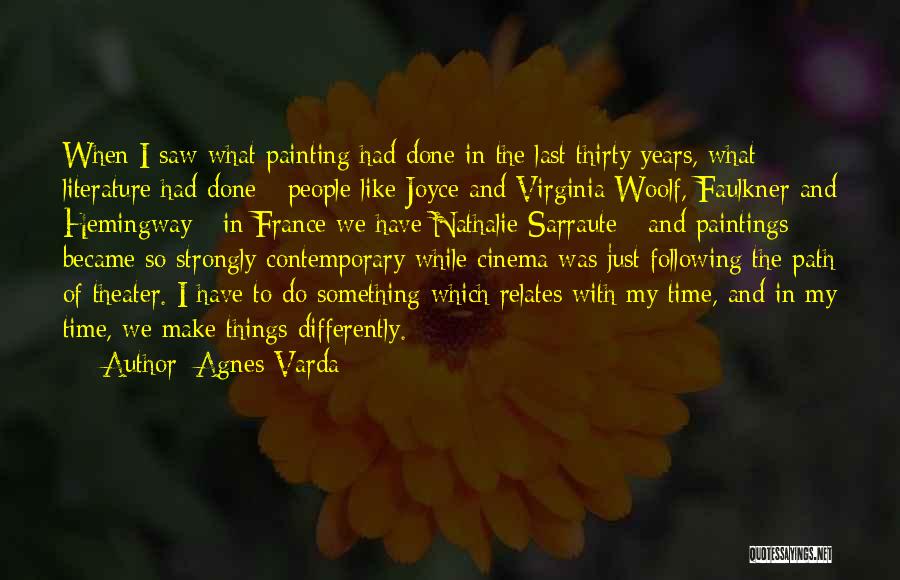
When I saw what painting had done in the last thirty years, what literature had done - people like Joyce and Virginia Woolf, Faulkner and Hemingway - in France we have Nathalie Sarraute - and paintings became so strongly contemporary while cinema was just following the path of theater. I have to do something which relates with my time, and in my time, we make things differently. — Agnes Varda
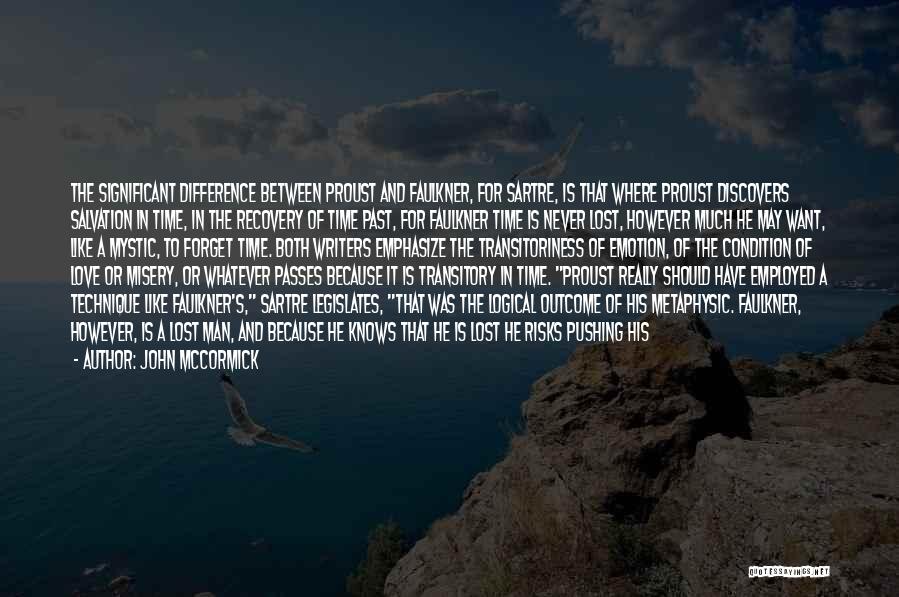
The significant difference between Proust and Faulkner, for Sartre, is that where Proust discovers salvation in time, in the recovery of time past, for Faulkner time is never lost, however much he may want, like a mystic, to forget time. Both writers emphasize the transitoriness of emotion, of the condition of love or misery, or whatever passes because it is transitory in time. "Proust really should have employed a technique like Faulkner's," Sartre legislates, "that was the logical outcome of his metaphysic. Faulkner, however, is a lost man, and because he knows that he is lost he risks pushing his thoughts to its conclusion. Proust is a classicist and a Frenchman; and the French lose themselves with caution and always end by finding themselves. — John McCormick

When I was fifteen, a companion and I, on a dare, went into the mound one day just at sunset. We saw some of those Indians for the first time; we got directions from them and reached the top of the mound just as the sun set. We had camping equiptment with us, but we made no fire. We didn't even make down our beds. We just sat side by side on that mound until it became light enough to find our way back to the road. We didn't talk. When we looked at each other in the gray dawn, our faces were gray, too, quiet, very grave. When we reached town again, we didn't talk either. We just parted and went home and went to bed. That's what we thought, felt, about the mound. We were children, it is true, yet we were descendants of people who read books and who were, or should have been, beyond superstition and impervious to mindless fear. — William Faulkner

He had a word, too. Love, he called it. But I had been used to words for a long time. I knew that that word was like the others: just a shape to fill a lack; that when the right time came, you wouldn't need a word for that any more than for pride or fear ... One day I was talking to Cora. She prayed for me because she believed I was blind to sin, wanting me to kneel and pray too, because people to whom sin is just a matter of words, to them salvation is just words too. — William Faulkner

It was as if the boy had already divined what his senses and intellect had not encompassed yet: that doomed wilderness whose edges were being constantly and punily gnawed at by men with plows and axes who feared it because it was wilderness, men myriad and nameless even to one another in the land where the old bear had earned a name, and through which ran not even a mortal beast but an anachronism indomitable and invincible out of an old dead time, a phantom, epitome and apotheosis of the old wild life which the little puny humans swarmed and hacked at in fury of abhorrence and fear like pygmies about the ankles of a drowsing elephant;
the old bear, solitary, indomitable, and alone; widowered childless and absolved of mortality
old Priam reft of his old wife and outlived all his sons. — William Faulkner

It was like a meeting between two iron knights of the old time, not for material gain but for principle - honor denied with honor, courage denied with courage - the deed done not for the end but for the sake of the doing, put to the ultimate test and proving nothing save the finality of death and the vanity of all endeavor. — William Faulkner

Carol would not be a bad one to [settle down] with. She's pretty and bright, and maybe this is what love is. She's good company: her interests broaden almost every day. She reads three books to my one, and I read a lot. We talk far into the night. She still doesn't understand the first edition game: Hemingway, she says, reads just as well in a two-bit paperback as he does in a $500 first printing. I can still hear myself lecturing her the first time she said that. Only a fool would read a first edition. Simply having such a book makes life in general and Hemingway in particular go better when you do break out the reading copies. I listened to myself and thought, This woman must think I'm a government-inspected horse's ass. Then I showed her my Faulkners, one with a signature, and I saw her shiver with an almost sexual pleasure as she touched the paper where he signed. Faulkner was her most recent god[.] — John Dunning

Was there anyone before you?" "You might have thought so at the time." "I feel like no one's ever loved me before." "I'm sure they did their best, but you always belonged to me." Monica Faulkner, Jonathan Drazen - Resist — C.D. Reiss

And he every man is the arbiter of his own virtues but let no man prescribe for another mans wellbeing and i temporary and he was the saddest word of all there is nothing else in the world of all there is nothing else in the world its not despair its not even time — William Faulkner

I don't want to turn 50 and say, 'Gosh, I wish I'd lived in that part of the world for a time. I wish I'd read that book by Faulkner.' I want time to delve back into Thoreau and Kafka. — Charlie Trotter

Maybe the only thing worse than having to give gratitude constantlyall the time, is having to accept it. — William Faulkner

Then Ben wailed again, hopeless and prolonged. It was nothing. Just sound. It might have been all time and injustice and sorrow become vocal for an instant by a conjunction of planets. — William Faulkner

The next time you try to seduce anyone, don't do it with talk, with words. Women know more about words than men ever will. And they know how little they can ever possibly mean. — William Faulkner

For the Lord aimed for him to do and not to spend too much time thinking, because his brain it's like a piece of machinery: it won't stand a whole lot of racking. It's best when it all runs along the same, doing the day's work and not no one part used no more than needful. — William Faulkner

We have a few old mouth-to-mouth tales; we exhume from old trunks and boxes and drawers letters without salutation or signature, in which men and women who once lived and breathed are now merely initials or nicknames out of some now incomprehensible affection which sound to us like Sanskrit or Chocktaw; we see dimly people, the people in whose living blood and seed we ourselves lay dormant and waiting, in this shadowy attenuation of time possessing now heroic proportions, performing their acts of simple passion and simple violence, impervious to time and inexplicable. — William Faulkner

A man is the sum of his misfortunes. One day you'd think misfortune would get tired but then time is your misfortune — William Faulkner

There are authors I truly enjoy to read, like John Irving and Don Delillo and Vollman and Hubert Selby Jr. and Hunter S. Thompson. And then there are writers that, while I enjoy their work, I read as a challenge to myself, to sharpen my knives, like Goethe or Genet or Faulkner or Joyce or Salinger. And I have a terrible weakness for music biographies. They are the best books to take on the road. I don't even have to like the band to enjoy the book. Want a wonderful literary anecdote? And watch your toes, because I'm dropping names like bricks. My favorite book of all time is Among The Dead by Michael Tolkin. Wonderful, dark, funny book. — Sammy Winston

Where the shadow of the bridge fell I could see down for a long way, but not as far as the bottom. When you leave a leaf in water a long time after awhile the tissue will be gone and the delicate fibres waving slow as the motion of sleep. They don't touch one another, no matter how knotted up they once were, no matter how close they lay once to the bones. — William Faulkner

[...] confusing time with its mathematical progression, as the old do, to whom all the past is not a diminishing road but, instead, a huge meadow which no winter ever touches. — William Faulkner

Eating the business of eating inside of you space too space and time confused Stomach saying noon brain saying eat oclock — William Faulkner

They come into white people's lives like that in sudden sharp black trickles that isolate white facts for an instant in unarguable truth like under a microscope; the rest of the time just voices that laugh when you see nothing to laugh at, tears when no reason for tears. They will bet on the odd or even number of mourners at a funeral. A brothel full of them in Memphis went into a religious trance ran naked into the street. It took three policemen to subdue one of them. Yes Jesus O good man Jesus O that good man. The — William Faulkner

As regards any specific book, I'm trying primarily to tell a story, in the most effective way I can think of, the most moving, the most exhaustive. But I think even that is incidental to what I am trying to do, taking my output ( the course of it) as a whole. I am telling the same story over and over, which is myself and the world ... I'm trying to say it all in one sentence, between one Cap and one period. I'm still trying to put it all, if possible on one pinhead. I don't know how to do it. All I know to do is to keep on trying in a new way ... life is a phenomenon but not a novelty, the same frantic steeplechase toward nothing everywhere and man stinks the same stink no matter where in time. — William Faulkner

I had seen and known negroes since I could remember. I just looked at them as I did at rain, or furniture, or food or sleep. But after that I seemed to see them for the first time not as people, but as a thing, a shadow in which I lived, we lived, all white people, all other people. I thought of all the children coming forever and ever into the world, white, with the black shadow falling upon them before they drew breath. And I seemed to see the black shadow in the shape of a cross. And it seemed like the white babies were struggling, even before they drew breath, to escape from the shadow that was not only upon them but was beneath them too, flung out like their arms were flung out, as if they were nailed to the cross. — William Faulkner

We will have to choose not between color nor race nor religion nor between East and West either, but simply between being slaves and being free. And we will have to choose completely and for good; the time is already past now when we can choose a little of each, a little of both. We can choose a state of slavedom, and if we are powerful enough to be among the top two or three or ten, we can have a certain amount of license - until someone more powerful rises and has us machine-gunned against a cellar wall. — William Faulkner

Good art can come out of thieves, bootleggers, or horse swipes. People really are afraid to find out just how much hardship and poverty they can stand. They are afraid to find out how tough they are. Nothing can destroy the good writer. The only thing that can alter the good writer is death. Good ones don't have time to bother with success or getting rich. Success is feminine and like a woman; if you cringe before her, she will override you. So the way to treat her is to show her the back of your hand. Then maybe she will do the crawling. — William Faulkner

He turned the pages in steady progression, though now and then he would seem to linger upon one page, one line, perhaps one word. He would not look up then. He would not move, apparently arrested and held immobile by a single word which had perhaps not yet impacted, his whole being suspended by the single trivial combination of letters in quiet and sunny space, so that hanging motionless and without physical weight he seemed to watch the slow flowing of time beneath him, thinking All I wanted was peace thinking, — William Faulkner

The artist doesn't have time to listen to the critics. The ones who want to be writers read the reviews, the ones who want to write don't have the time to read reviews. — William Faulkner

At one time I thought the most important thing was talent. I think now that - the young man or the young woman must possess or teach himself, train himself, in infinite patience, which is to try and to try and to try until it comes right. He must train himself in ruthless intolerance. That is, to throw away anything that is false no matter how much he might love that page or that paragraph. The most important thing is insight, that is ... curiosity to wonder, to mull, and to muse why it is that man does what he does. And if you have that, then I don't think the talent makes much difference, whether you've got that or not.
[Press conference, University of Virginia, May 20, 1957] — William Faulkner

Life is not interested in good and evil. Don Quixote was constantly choosing between good and evil, but then he was choosing in his dream state. He was mad. He entered reality only when he was so busy trying to cope with people that he had no time to distinguish between good and evil. Since people exist only in life, they must devote their time simply to being alive. Life is motion, and motion is concerned with what makes man move - which is ambition, power, pleasure. What time a man can devote to morality, he must take by force from the motion of which he is a part. He is compelled to make choices between good and evil sooner or later, because moral conscience demands that from him in order that he can live with himself tomorrow. His moral conscience is the curse he had to accept from the gods in order to gain from them the right to dream. — William Faulkner

Here it is it was right here all the time was it come on I got up and followed we went up the hill the crickets hushing before us its funny how you can sit down and drop something and have to hunt all around for it the gray it was gray with dew slanting up into the gray sky then the trees beyond damn that honeysuckle I wish it would stop you used to like it we — William Faulkner

I'd have wasted a lot of time and trouble before I learned that the best way to take all people, black or white, is to take them for what they think they are, then leave them alone. — William Faulkner

Thinking remembering how his uncle had said that all man had was time, all that stood between him and the death he feared and abhorred was time yet he spent half of it inventing ways of getting the other half past: — William Faulkner

Without courage, honor, compassion, pity, love and sacrifice, as William Faulkner pointed out, we know not of love, but lust. We debase our audience. But we can ennoble and enrich our viewers and ourselves in our journey through this good time, this precious time, this great and wonderful experience we call life. — Earl Hamner Jr.

My enlightened racial consciousness demands that I reject the so-called greatness of William Faulkner and William Shakespeare. I don't have time for any of that Hamlet jive -- but Marvel superheroes are super cool. — Ta-Nehisi Coates

At first it had been a torrent; now it was a tide, with a flow and ebb. During its flood she could almost fool them both. It was as if out of her knowledge that it was just a flow that must presently react was born a wilder fury, a fierce denial that could flag itself and him into physical experimentation that transcended imagining, carried them as though by momentum alone, bearing them without volition or plan. It was as if she knew somehow that time was short, that autumn was almost upon her, without knowing yet the exact significance of autumn. It seemed to be instinct alone: instinct physical and instinctive denial of the wasted years. Then the tide would ebb. Then they would be stranded as behind a dying mistral, upon a spent and satiate beach, looking at one another like strangers, with hopeless and reproachful (on his part with weary: on hers with despairing) eyes. — William Faulkner

It was the black blood which swept him by his own desire beyond the aid of any man, swept him up into that ecstasy out of a black jungle where life has already ceased before the heart stops and death is desire and fulfillment. And then the black blood failed him again, as it must have in crises all his life. He did not kill the minister. He merely struck him with the pistol and ran on and crouched behind that table and defied the black blood for the last time, as he had been defying it for thirty years. He crouched behind that overturned table and let them shoot him to death, with that loaded and unfired pistol in his hand. — William Faulkner

When in reality she is waging a mild battle with that providential caution of the old earth of and with and by which she lives. This time she conquers. — William Faulkner

Slaughter personified to him every evil of this war. It would never end for Tom until he had dealt with Slaughter. His chance had been delayed last night. The next time he encountered the Colonel, he'd kill him. — C.G. Faulkner

I give you the mausoleum of all hope and desire ... I give it to you not that you may remember time, but that you might forget it now and then for a moment and not spend all of your breath trying to conquer it. Because no battle is ever won he said. They are not even fought. The field only reveals to man his own folly and despair, and victory is an illusion of philosophers and fools. — William Faulkner
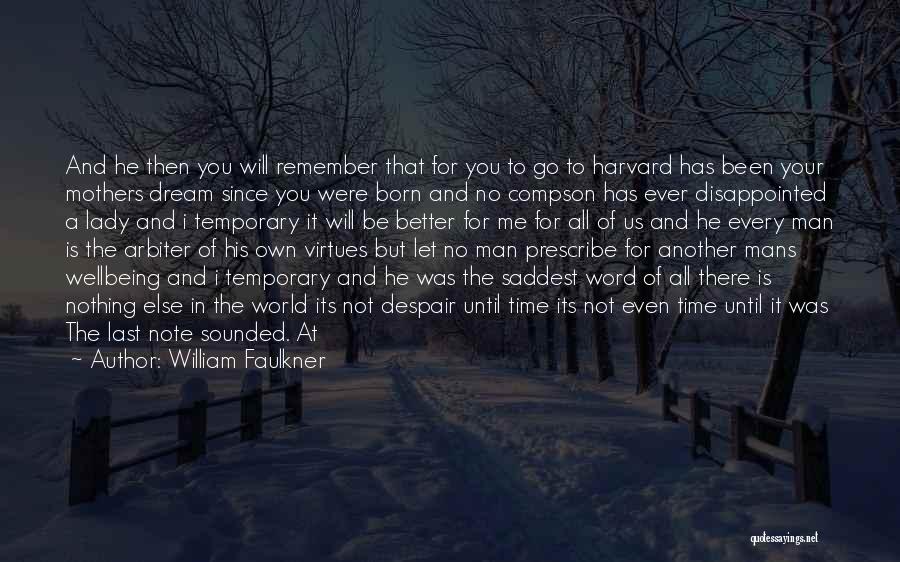
And he then you will remember that for you to go to harvard has been your mothers dream since you were born and no compson has ever disappointed a lady and i temporary it will be better for me for all of us and he every man is the arbiter of his own virtues but let no man prescribe for another mans wellbeing and i temporary and he was the saddest word of all there is nothing else in the world its not despair until time its not even time until it was The last note sounded. At — William Faulkner

There is solid evidence for the fact that when women speak more than 30 percent of the time, men perceive them as dominating the conversation; well, similarly, if, say, two women in a row get one of the big annual literary awards, masculine voices start talking about feminist cabals, political correctness, and the decline of fairness in judging. The 30 percent rule is really powerful. If more than one woman out of four or five won the Pulitzer, the PEN/Faulkner, the Booker - if more than one woman in ten were to win the Nobel literature prize - the ensuing masculine furore would devalue and might destroy the prize. Apparently, literary guys can only compete with each other. Put on a genuinely equal competitive footing with women, they get hysterical. — Ursula K. Le Guin

All right. What do you want me to do?' 'Go out there and look at him,' Lucas said. 'Go out where and look at who?' he said. But he understood all right. It seemed to him that he had known all the time what it would be; he thought with a kind of relief So that's all it is even while his automatic voice was screeching with outraged disbelief: 'Me? Me? — William Faulkner

Anna Karenina, Anna Karenina, Anna Karenina when asked the three best novels of all time. — William Faulkner

He began to breathe deep. He could feel himself breathing deep, as if each time his insides were afraid that next breath they would not be able to give far enough and that something terrible would happen, and that all the time he could look down at himself breathing, at his chest, and see no movement at all, like when dynamite first begins, gathers itself for the now Now NOW, the shape of the outside of the stick does not change — William Faulkner

But this time as soon as he moved she began to fade. He stopped at once, not breathing again, motionless, willing his eyes to see that she had stopped too. But she had not stopped. She was fading, going. "Wait," he said, talking as sweet as he had ever heard his voice speak to a woman: "Den lemme go wid you, honey." But she was going. — William Faulkner

[B]ecause the second time I ever saw you I learned what I had read in books but I never had actually believed: that love and suffering are the same thing and that the value of love is the sum of what you have to pay for it and anytime you get it cheap you have cheated yourself. — William Faulkner
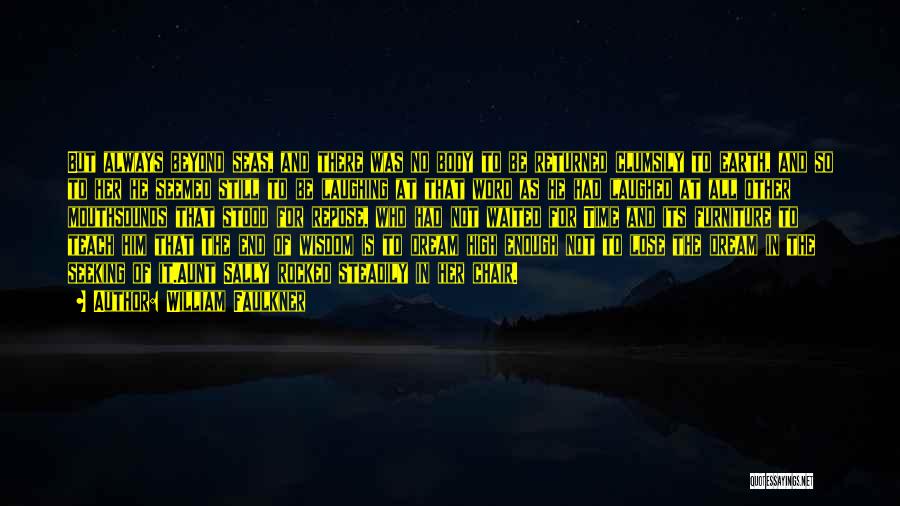
But always beyond seas, and there was no body to be returned clumsily to earth, and so to her he seemed still to be laughing at that word as he had laughed at all other mouthsounds that stood for repose, who had not waited for Time and its furniture to teach him that the end of wisdom is to dream high enough not to lose the dream in the seeking of it.
Aunt Sally rocked steadily in her chair. — William Faulkner

My ideal job? Landlord of a bordello! The company's good and the mornings are quiet, which is the best time to write. — William Faulkner

The past is never dead. It's not even past. — William Faulkner
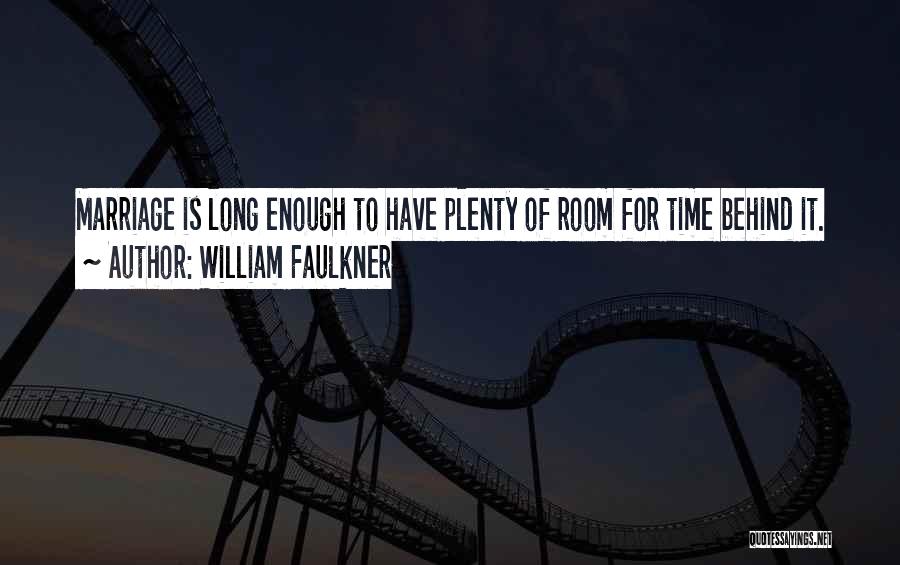
Marriage is long enough to have plenty of room for time behind it. — William Faulkner

He puts his shoes on, stomping into them, like he does everything, like he is hoping all the time he really cant do it and can quit trying to. — William Faulkner

Sometimes i lose faith in human nature for a time; i am assailed by doubt. — William Faulkner

I heard that my mother is dead. I wish I had time to let her die. I wish I had time to wish I had. It is because in the wild and outraged earth too soon too soon too soon. It's not that I wouldn't and will not it's that it is too soon too soon too soon. — William Faulkner

Ellen was in her late thirties, plump, her face unblemished still. It was as though whatever marks being in the world had left upon it up to the time the aunt vanished had been removed from between the skeleton and the skin, between the sum of experience and the envelope in which it resides, by intervening years of annealing and untroubled flesh. — William Faulkner
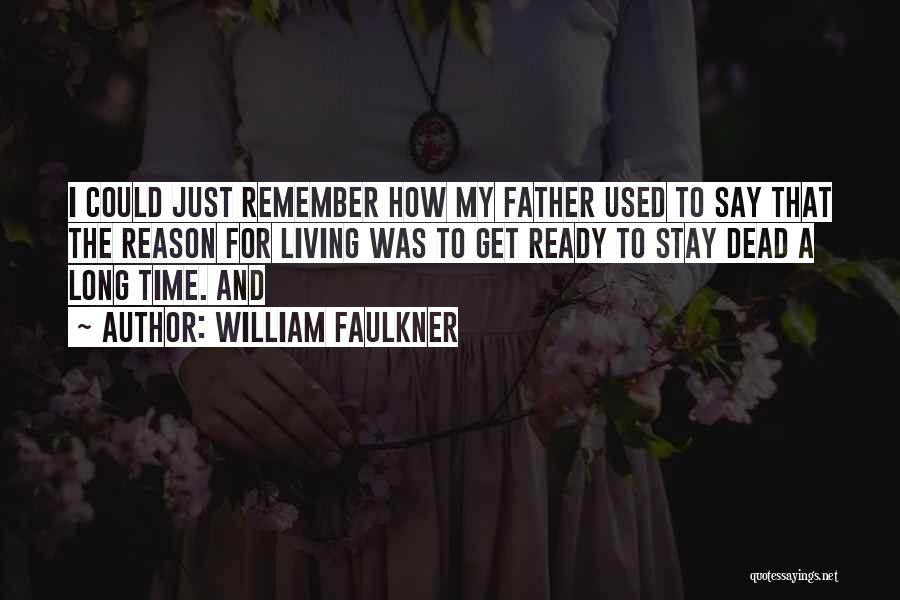
I could just remember how my father used to say that the reason for living was to get ready to stay dead a long time. And — William Faulkner

I could hear my watch whenever the car stopped, but not often they were already eating Who would play a Eating the business of eating inside of you space too space and time confused Stomach saying noon brain saying eat o clock All right I wonder what time it is what of it. — William Faulkner

The writer doesn't need economic freedom. All he needs is a pencil and some paper. I've never known anything good in writing to come from having accepted any free gift of money. The good writer never applies to a foundation. He's too busy writing something. If he isn't first rate he fools himself by saying he hasn't got time or economic freedom. Good art can come out of thieves, bootleggers, or horse swipes. People really are afraid to find out just how much hardship and poverty they can stand. They are afraid to find out how tough they are. — William Faulkner

It's a dreadfully long monster of a book, and I certainly won't have time to read it, but I'm giving it a thorough skimming. The authors are utterly incompetent - no sense of style or structure at all. It starts out as a detective story, switches to science-fiction, then goes off into the supernatural, and is full of the most detailed information of dozens of ghastly boring subjects. And the time sequence is all out of order in a very pretentious imitation of Faulkner and Joyce. Worst yet, it has the most raunchy sex scenes, thrown in just to make it sell, I'm sure, and the authors - whom I've never heard of - have the supreme bad taste to introduce real political figures into this mishmash and pretend to be exposing a real conspiracy. You can be sure I won't waste time reading such rubbish. — Robert Shea

And I will look down and see my murmuring bones and the deep water like wind, like a roof of wind, and after a long time they cannot distinguish even bones upon the lonely and inviolate sand. — William Faulkner

She wasn't too big, heroic, what they call Junoesque. It was that there was just too much of what she was for any one human female package to contain, and hold: too much of white, too much of female, too much of maybe just glory, I don't know: so that at first sight of her you felt a kind of shock of gratitude just for being alive and being male at the same instance with her in space and time, and then in the next second and forever after a kind of despair because you knew there would never be enough of any one male to match and hold and deserve her; grief forever after because forever after nothing less would ever do. — William Faulkner

A period of time is as much an organising principle for a work of fiction as a sense of place. You can do geography, as Faulkner did, or you can dwell on a particular period. It provides the same framework. — E.L. Doctorow

So the only environment the artist needs is whatever peace, whatever solitude, and whatever pleasure he can get at not too high a cost. All the wrong environment will do is run his blood pressure up; he will spend more time being frustrated or outraged. My own experience has been that the tools I need for my trade are paper, tobacco, food, and a little whiskey. — William Faulkner

Roofed by the woven canopy of blind annealing grass-roots and the roots of trees, dark in the blind dark of time's silt and rich refuse - the constant and unslumbering anonymous worm-glut and the inextricable known bones - Troy's Helen and the nymphs and the snoring mitred bishops, the saviors and the victims and the kings - it wakes, up-seeping, attritive in uncountable creeping channels: first, root; then frond by frond, from whose escaping tips like gas it rises and disseminates and stains the sleep-fast earth with drowsy insect-murmur; then, still upward-seeking, creeps the knitted bark of trunk and limb where, suddenly louder leaf by leaf and dispersive in diffusive sudden speed, melodious with the winged and jeweled throats, it upward bursts and fills night's globed negation with jonquil thunder. — William Faulkner

Dalton Ames. Dalton Ames. Dalton Shirts. I thought all the time they were khaki, army issue khaki, until I saw they were of heavy Chinese silk or finest flannel because they made his face so brown his eyes so blue. Dalton Ames. It just missed gentility. Theatrical fixture. Just papier-mache, then touch. Oh. Asbestos. Not quite bronze. — William Faulkner

The whiskey died away in time and was renewed and died again, but the street ran on. From that night the thousand streets ran as one street, with imperceptible corners and changes of scene ... — William Faulkner

And when a man that old takes up money-hunting, it's like when he takes up gambling or whisky or women. He aint going to have time to quit. — William Faulkner

All of us have failed to match our dream of perfection. I rate us on the basis of our splendid failure to do the impossible. If I could write all my work again, I'm convinced I could do it better. This is the healthiest condition for an artist. That's why he keeps working, trying again: he believes each time that this time he will do it, bring it off. Of course he won't. — William Faulkner

That's what they mean by the womb of time: the agony and the despair of spreading bones, the hard girdle in which lie the outraged entrails of events. — William Faulkner

And so I told myself to take that one. Because Father said clocks slay time. He said time is dead as long as it is being clicked off by little wheels; only when the clock stops does time come to life. The hands were extended, slightly off the horizontal at a faint angle, like a gull tilting into the wind. — William Faulkner

It was a period when live TV was just starting and getting popular and they took it seriously too. Not so much like TV now. They did [Ernst] Hemingway and [William] Faulkner - and they're all wonderful artists and it just was very creative at that time. — Gena Rowlands
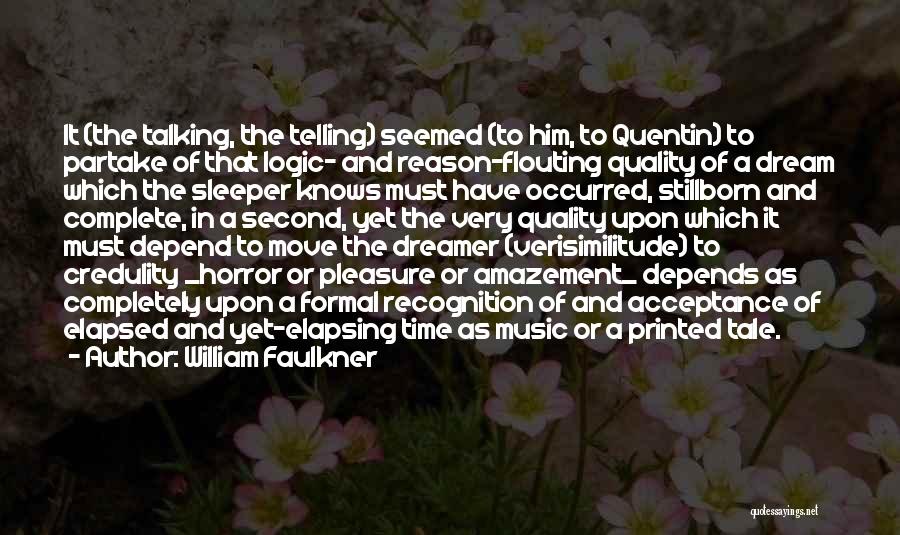
It (the talking, the telling) seemed (to him, to Quentin) to partake of that logic- and reason-flouting quality of a dream which the sleeper knows must have occurred, stillborn and complete, in a second, yet the very quality upon which it must depend to move the dreamer (verisimilitude) to credulity _horror or pleasure or amazement_ depends as completely upon a formal recognition of and acceptance of elapsed and yet-elapsing time as music or a printed tale. — William Faulkner

And George Farr had the town, the earth, the world to himself and his sorrow. Music came faint as a troubling rumor beneath the spring night, sweetened by distance: a longing knowing no ease. (Oh God, oh God!)
At last George Farr gave up trying to see her. He had 'phoned vainly and time after time, at last the telephone became the end in place of the means: he had forgotten why he wanted to reach her. Finally he told himself that he hated her, that he would go away; finally he was going to as much pains to avoid her as he had been to see her. So he slunk about the streets like a criminal, avoiding her, feeling his his very heart stop when he did occasionally see her unmistakable body from a distance. And at night he lay sleepless and writhing to think of her, then to rise and don a few garments and walk past her darkened house, gazing in slow misery at the room in which he knew she lay, soft and warm, in intimate slumber, then to return to home and bed to dream of her brokenly. — William Faulkner

Everyone in the South has no time for reading because they are all too busy writing. — William Faulkner

I love Virginians because Virginians are all snobs and I like snobs. A snob has to spend so much time being a snob that he has little time left to meddle with you. — William Faulkner

Probably by that time he had learned that there were three things and no more: breathing, pleasure, darkness; and without money there could be no pleasure, and without pleasure it would not even be breathing but mere protoplasmic inhale and collapse of blind unorganism in a darkness where light never began. — William Faulkner

The reason for living was to get ready to stay dead a long time. — William Faulkner

Most of life is just a preparation for getting ready to be dead for a very long period of time. — William Faulkner

She is not listening. If she could hear words like that she would not be getting down from this wagon, with that belly and that fan and that little bundle, alone, bound for a place she never saw before and hunting for a man she ain't going to ever see again and that she has already seen one time too many as it is. — William Faulkner

Nothing can destroy the good writer. The only thing that can alter the good writer is death. Good ones don't have time to bother with success or getting rich. — William Faulkner

Then I began to smell it again, like each time he returned, like the day back in the spring when I rode up on the drive standing in one of his stirrups - that odor in the his clothes and beard and flesh too which I believed was the smell of powder and glory, the elected victorious but know better now: know now to have been only the will to endure, a sardonic and even humorous declining of self-delusion which is not even kin to that optimism which believes that that which is about to happen to us can possibly be the worst which we can suffer. — William Faulkner







